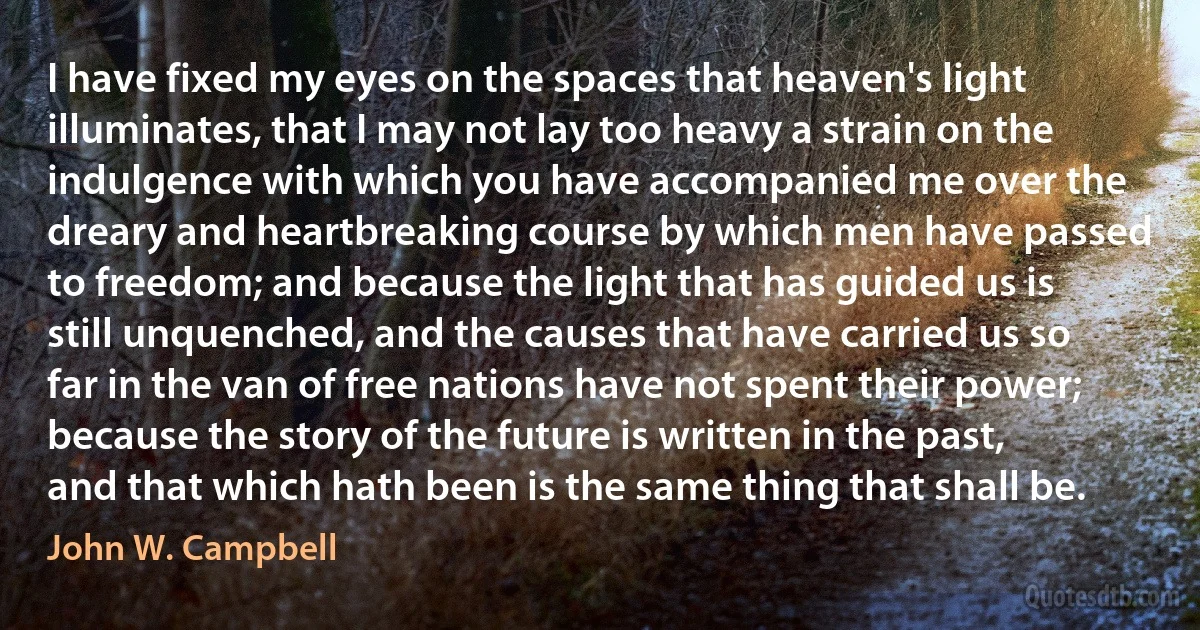John W. Campbell quotes - page 4
Although, therefore, the theory of nationality is more absurd and more criminal than the theory of socialism, it has an important mission in the world, and marks the final conflict, and therefore the end, of two forces which are the worst enemies of civil freedom, - the absolute monarchy and the revolution.

John W. Campbell
The inflexible integrity of the moral code is, to me, the secret of the authority, the dignity, the utility of History.
If we may debase the currency for the sake of genius, or success, or rank, or reputation, we may debase it for the sake of a man's influence, of his religion, of his party, of the good cause which prospers by his credit and suffers by his disgrace. Then History ceases to be a science, an arbiter of controversy, a guide of the Wanderer, the upholder of that moral standard which the powers of earth and religion itself tend constantly to depress. It serves where it ought to reign; and it serves the worst cause better than the purest.

John W. Campbell
I have shown you how Machiavelli supplied the immoral theory needful for the consummation of royal absolutism; the absolute oligarchy of Venice required the same assurance against the revolt of conscience. It was provided by a writer as able as Machiavelli, who analyzed the wants and resources of aristocracy, and made known that its best security is poison.

John W. Campbell
The tide was running fast when the Reformation began at Wittenberg, and it was to be expected that Luther's influence would stem the flood of absolutism. For he was confronted everywhere by the compact alliance of the Church with the State; and great part of his country was governed by hostile potentates who were prelates of the court of Rome. He had, indeed, more to fear from temporal than from spiritual foes.

John W. Campbell
It was manifest that all persons who had learned that political science is an affair of conscience rather than of might or expediency, must regard their adversaries as men without principle, that the controversy between them would perpetually involve morality, and could not be governed by the plea of good intentions which softens down the asperities of religious strife. Nearly all the greatest men of the seventeenth century repudiated the innovation. In the eighteenth, the two ideas of Grotius, that there are certain political truths by which every state and every interest must stand or fall, and that society is knit together by a series of real and hypothetical contracts, became, in other hands, the lever that displaced the world. When, by what seemed the operation of an irresistible and constant law, royalty had prevailed over all enemies and all competitors, it became a religion. Its ancient rivals, the baron and the prelate, figured as supporters by its side.

John W. Campbell
The conflict between liberty under divine authority and the absolutism of human authorities ended disastrously. ...In the very year 586 [BCE], in which the flood of Asiatic despotism closed over the city which had been, and was destined again to be, the sanctuary of freedom in the East, a new home was prepared for it in the West, where, guarded by the sea and the mountains, and by valiant hearts, that stately plant was reared under whose shade we dwell, and which is extending its invincible arms so slowly and yet so surely over the civilised world.

John W. Campbell
Legally and to outward seeming the American President is the successor of Washington, and still enjoys powers devised and limited by the Convention of Philadelphia. In reality the new President differs from the Magistrate imagined by the Fathers of the Republic as widely as Monarchy from Democracy...

John W. Campbell
What followed, during many generations, was the cruel domination of class over class, the oppression of the poor by the rich, and of the ignorant by the wise. The spirit of that domination found passionate utterance in the verses of the aristocratic poet Theognis,... who longed to drink the blood of his political adversaries. From these oppressors the people of many cities sought deliverance in the less intolerable tyranny of revolutionary usurpers. The remedy gave new shape and energy to the evil. ...rights secured by equal laws and by sharing power existed nowhere.

John W. Campbell
Six hundred years before the birth of Christ absolutism held unbounded sway. Throughout the East it was propped by the unchanging influence of priests and armies. In the West, where there were no sacred books requiring trained interpreters, the priesthood acquired no preponderance, and when the kings were overthrown their powers passed to aristocracies of birth.

John W. Campbell
A century ago it was perfectly well known that whoever had one audience of a Master in Chancery was made to pay for three, but no man heeded the enormity until it suggested to a young lawyer that it might be well to question and examine with rigorous suspicion every part of a system in which such things were done. The day on which that gleam lighted up the clear hard mind of Jeremy Bentham is memorable in the political calendar beyond the entire administration of many statesmen.

John W. Campbell
Their [Athenians] history furnishes the classic example of the peril of Democracy under conditions singularly favourable. For the Athenians were not only brave and patriotic and capable of generous sacrifice, but they were the most religious of the Greeks. They venerated the constitution which had given them prosperity and equality and the pride of freedom...They tolerated considerable variety of opinion, and great license of speech...Thus they became the only people of antiquity that grew great by democratic institutions. But the possession of unlimited power, which corrodes the conscience, hardens the heart, and confounds the understanding of monarchs exercised its demoralizing influence on the illustrious Democracy of Athens.

John W. Campbell
The Stoics could only advise the wise man to hold aloof from politics, keeping the unwritten law in his heart. But when Christ said: "Render unto Cæsar the things that are Cæsar's, and unto God the things that are God's," those words, spoken on His last visit to the Temple, three days before His death, gave to the civil power, under the protection of conscience, a sacredness it had never enjoyed, and bounds it had never acknowledged; and they were the repudiation of absolutism and the inauguration of freedom.

John W. Campbell


![The sentiment on which [papal] infallibility was founded could not be reached by argument, the weapon of human reason, but resided in conclusions transcending evidence, and was the inaccessible postulate rather than a demonstrable consequence of a system of religious faith. (John W. Campbell)](https://cdn.quotesdtb.com/img/quotes_images_webp/76/john-w-campbell-argument-942876.webp)
